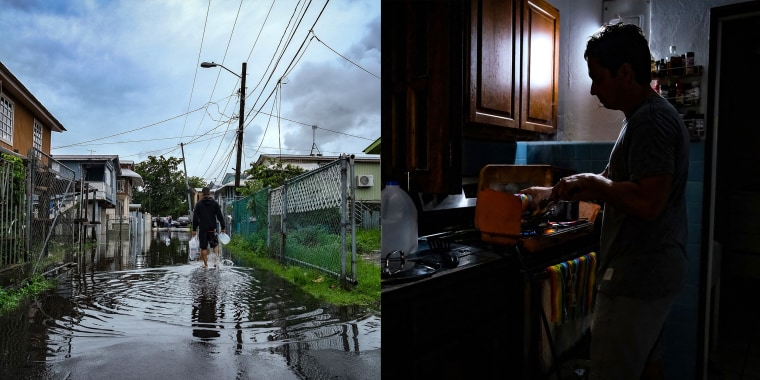After Hurricane Maria battered Puerto Rico five years ago, then-President Donald Trump complained that getting much-needed aid to an island of more than 3 million American citizens was too hard for the world’s most powerful country to achieve. He blamed geography — as if Puerto Rico were in another universe. “This is an island,” Trump said of the American colony. “Surrounded by water. Big water. Ocean water.”
After Hurricane Maria battered Puerto Rico five years ago, Donald Trump complained that getting aid to an island of more than 3 million American citizens was too hard.
On Thursday, as President Joe Biden addressed both the destruction Hurricane Ian visited on Florida on Wednesday and the challenges Puerto Ricans are still facing after Hurricane Fiona hit Sept. 18, he presented a different message.
“While we’re seeing the devastating images in Florida, I want to be clear: To the people of Puerto Rico, we’re not gone away,” Biden said at Federal Emergency Management Agency headquarters. “I am committed to you and the recovery of the island. We’ll stand by you for however long it takes to get it done.”
Even so, the Puerto Rican government still needs a federal waiver so foreign-flagged ships can deliver much-needed diesel to run generators and cell towers. The antiquated Jones Act allows only U.S. ships to bring goods and supplies to Puerto Rico. For decades, Puerto Ricans have railed against how much the act has stunted economic growth and just recoveries, and the latest example of it being cited to explain a delay of aid provides another reason why the Jones Act should be overturned immediately.
Such a scenario would never occur in Florida (or in the Carolinas, where Ian was headed Friday) marking a stark difference between states of the union and the United States’ colonies.
A comparison of the White House’s Fiona response and its plan to respond to Ian in Florida reveals the simple truth: States in the U.S. get more aid and resources than Puerto Rico, leading to unequal and unjust recovery.
A 900-page report from the U.S. Commission on Civil Rights released Sept. 21 chastised FEMA for what the commission determined were mistakes during Maria. In short, FEMA failed to adequately respond to the crisis with cultural competency or understanding of the community it was trying to help.
"With regard to Hurricane Maria, the people of Puerto Rico, we believe, were treated in a manner inconsistent with the mandate toward equality, fairness and impartiality," Commissioner Michael Yaki told NBC News.
Biden’s decision to mention Fiona on Thursday merits praise, but given that little has changed since Maria in 2017 and given that the nation’s focus has shifted to Ian, the question remains: Will Puerto Rico be forgotten again?
The answer is not so clear.
A Morning Consult poll this week found that 75% of registered voters believe that the federal government is responsible for Fiona recovery efforts in Puerto Rico. On one hand, it’s a bad question to ask, however well-intentioned it may have been. Of course the federal government needs to help Puerto Rico; Puerto Ricans are U.S. citizens. On the other hand, it’s telling that 25% of those polled either don’t believe the government is responsible for helping Puerto Rico recover (17%) or say they're unsure (8%). Maybe they’re responding to the excuses Trump gave in 2017 about why federal aid and help is tougher to deliver. Or maybe they wrongly see the people on the island as foreigners.
The mistakes FEMA made beginning in 2017 have held up major portions of Puerto Rico’s Maria recovery plan.
Still, Biden has delivered in a few ways. First, he approved a major disaster declaration for the island shortly after Fiona struck and said the federal government will pay 100% of all recovery costs for the first month. Yet, as of Friday, more than 10 days after the Category 1 storm hit, the power is still out in the hardest-hit areas, causing constant despair and frustration.
The mistakes that the civil rights commission says FEMA made beginning in 2017 have held up major portions of Puerto Rico’s Maria recovery plan, and we should all hope that the lessons have been learned. FEMA was better prepared for Fiona than it was for Maria. That extra preparedness, according to the White House, included prepositioning critical supplies on the island before Fiona’s arrival. The commission’s push for “equality, fairness and impartiality” apparently had some effect, although Puerto Rico’s has been unable to access billions of dollars the federal government earmarked for Maria recovery.
Climate change is indeed real, and the intensity of hurricanes has increased. A hurricane doesn’t determine where it will strike, and emergency response and help need to be equal no matter whether affected Americans are on the mainland or in one of America’s colonies.
Right now, tragedy and hopelessness have befallen millions of Americans who have been caught in a storm’s path. Not one individual’s life should be above another's. Our hoping for the best for Florida and South Carolina shouldn’t lead us to ignore Puerto Rico. The government must break through the red tape and restore the island to wholeness — as Biden said, for however long it takes to get it done.

